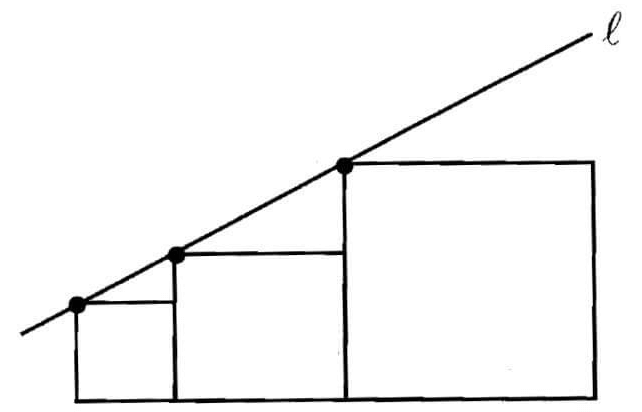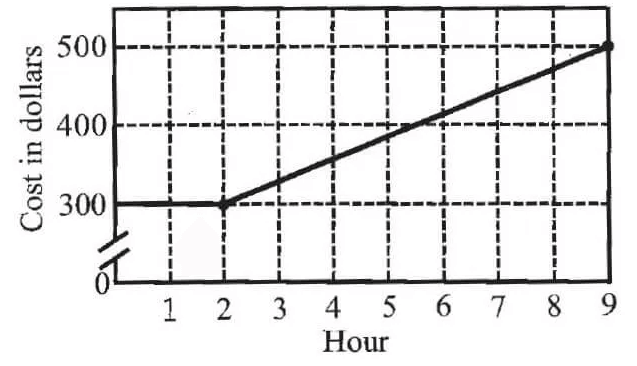LCM METHOD FOR TIME AND WORK PROBLEMS
In this section, you will learn how to solve time and work problems using least common multiple.
Let us look at the steps involved in solving time and work problems using least common multiple.
Step 1 :
Find the least common multiple for all the given days / hours / minutes.
Step 2 :
Least common multiple found in step 1 is considered as total amount of work to be completed.
Step 3 :
Use the formula given below to solve the problem.
Further process from step 3 will be depending upon the situation given in the problem.
It has been explained clearly in the examples given below.
Example 1 :
A
can do a piece of work in 8 days. B can do the same in 14 days. In how
many days can the work be completed if A and B work together?
Solution :
Let us find LCM for the given no. of days 8 and 14.
L.C.M of (8, 14) is 56.
Therefore, the total work is 56 units.
A can do = ⁵⁶⁄₈ = 7 units/day
B can do = ⁵⁶⁄₁₄ = 4 units/day
(A + B) can do = 11 units per day
So, no. of days taken by (A + B) to complete the same work is
= ⁵⁶⁄₁₁ days
Example 2 :
A
and B together can do a piece of work in 12 days and A alone can
complete the work in 21 days. How long will B alone to complete the
same work?
Solution :
Let us find LCM for the given no. of days 12 and 21.
L.C.M of (12, 21) is 84.
Therefore, the total work is 84 units.
A can do = ⁸⁴⁄₂₁ = 4 units/day
(A + B) can do = ⁸⁴⁄₁₂ = 7 units/day
B can do = (A + B) - A = 7 - 4 = 3 units/day
So, no. of days taken by B alone to complete the same work is
= ⁸⁴⁄₃
= 28 days
Example 3 :
A
and B together can do a piece of work in 110 days. B and C can do it in
99 days. C and A can do the same work in 90 days. How long would each
take to complete the work?
Solution :
Let us find LCM for the given no. of days 110, 99 and 90.
L.C.M of (110, 99, 90) is 990.
Therefore, the total work is 990 units.
A + B = ⁹⁹⁰⁄₁₁₀ = 9 units/day ---->(1)
B + C = ⁹⁹⁰⁄₉₉ = 10 units/day ---->(2)
A + C = ⁹⁹⁰⁄₉₀ = 11 units/day ---->(3)
By adding (1), (2) & (3), we get,
2A + 2B + 2C = 30 units/day
2(A + B + C) = 30 units/day
A + B + C = 15 units/day ---->(4)
(4) - (1) ----> (A + B + C) - (A + B) = 15 - 9 = 6 units
C can do = 6 units/day
C will take = ⁹⁹⁰⁄₆ = 165 days
(4) - (2) ----> (A + B + C) - (B + C) = 15 - 10 = 5 units
A can do = 5 units/day
A will take = ⁹⁹⁰⁄₅ = 198 days
(4) - (3) ----> (A + B + C) - (A + C) = 15 - 11 = 4 units
Therefore B can do 4 units per day.
So, the number of days taken by B to complete the work is
= ⁹⁹⁰⁄₄
= 247.5 days
Example 4 :
A
and B can do a work in 15 days. B and C can do it in 30 days. C and A
can do the same work in 18 days. They all work together for 9 days and
then A left. In how many days can B and C finish remaining work?
Solution :
Let us find LCM for the given no. of days 15, 30 and 18.
L.C.M of (15, 30, 18) is 90 units.
Therefore, the total work is 90 units.
A + B = ⁹⁰⁄₁₅ = 6 units/day ---->(1)
B + C = ⁹⁰⁄₃₀ = 3 units/day ---->(2)
A + C = ⁹⁰⁄₁₈ = 5 units/day ---->(3)
By adding (1), (2) & (3), we get,
2A + 2B + 2C = 14 units/day
2(A + B + C) = 14 units/day
A + B + C = 7 units/day ---->(4)
A, B and C all work together for 9 days.
No. of units completed in these 9 days is
= 7 ⋅ 9
= 63 units
Remaining work to be completed by B and C is
= 90 - 63
= 27 units
So, no. of days taken by B and C to complete the work is
= ²⁷⁄₃
= 9 days
[Because (B + C) = 3 units/day]
Example 5 :
A
and B each working alone can do a work in 20 days and 15 days
respectively. They started the work together, but B left after sometime
and A finished the remaining work in 6 days. After how many days from
the start, did B leave?
Solution :
Let us find LCM for the given no. of days 20 and 15.
L.C.M of (20, 15) is 60 units.
Therefore, the total work is 60 units.
A can do = ⁶⁰⁄₂₀ = 3 units/day
B can do = ⁶⁰⁄₁₅ = 4 units/day
(A + B) can do = 7 units/day
The work done by A alone in 6 days is
= 6 ⋅ 3
= 18 units
Then the work done by (A + B) is
= 60 - 18
= 42 units
So, initially no. of days worked by A and B together is
= ⁴²⁄₇
= 6 days
Example 6 :
A is 3 times as fast as B and is able to complete the work in 30 days less than B. Find the time in which they can complete the work together.
Solution :
A and B working capability ratio is 3 : 1.
Then, A and B time taken ratio is 1 : 3.
From the ratio,
Time taken by A = k
Time taken by B = 3k
Given : A takes 30 days less than B.
Then, we have
3k - k = 30
2k = 30
k = 15
Therefore,
time taken by A = 15 days
time taken by B = 3 ⋅ 15 = 45 days
LCM (15, 45) is 45.
Total work is 45 units.
A can do = ⁴⁵⁄₁₅ = 3 units/day
B can do = ⁴⁵⁄₄₅ = 1 unit/day
(A + B) can do = 4 units per day
So, no. of days taken by (A + B) to complete the same work is
= ⁴⁵⁄₄
= 11¼ days
Example 7 :
A
and B working separately can do a piece of work in 10 and 8 days respectively. They work on alternate days starting with A on the first day. In how many days will the work be completed?
Solution :
Let us find LCM of the given no. of days 10 and 8.
LCM of (10, 8) is 40.
Total work is 40 units.
A can do = ⁴⁰⁄₁₀ = 4 units/day
B can do = ⁴⁰⁄₈ = 5 units/day
On the first two days,
A can do 4 units on the first day and B can do 5 units on the second day.
(Because they are working on alternate days)
Total units completed in the 1st day and 2nd day is
= 9 units ----(1)
Total units completed in the 3rd day and 4th day is
= 9 units ----(2)
Total units completed in the 5th day and 6th day is
= 9 units ----(3)
Total units completed in the 7th day and 8th day is
= 9 units ----(4)
By adding (1),(2),(3) & (4), we get 36 units.
That is, in 8 days 36 units of the work completed.
Remaining work is
= 40 - 36
= 4 units
These units will be completed by A on the 9th day.
So, the work will be completed in 9 days.
Example 8 :
Two pipes A and B can fill a tank in 16 minutes and 20 minutes respectively. If both the pipes are opened simultaneously, how long will it take to complete fill the tank?
Solution :
Let us find LCM of the given no. of minutes 16 and 20.
LCM of (16, 20) is 80.
Total work is 80 units.
A can fill = ⁸⁰⁄₁₆ = 5 units/min
B can fill = ⁸⁰⁄₂₀ = 4 units/min
(A + B) can fill = 9 units/min
So, no. of minutes taken by (A + B) to fill the tank is
= ⁸⁰⁄₉
= 8⁸⁄₉ minutes
Example 9 :
Pipe A can fill a tank in 10 minutes. Pipe B can fill the same tank in 6 minutes. Pipe C can empty the tank in 12 minutes. If all of them work together, find the time taken to fill the empty tank.
Solution :
Let us find LCM of the given no. of minutes 10, 6 and 12.
LCM of (10, 6, 12) is 60.
Total work is 60 units.
A can fill = ⁶⁰⁄₁₀ = 6 units/min
B can fill = ⁶⁰⁄₆ = 10 units/min
(A + B) can fill = 16 units/min
C can empty = ⁶⁰⁄₁₂ = 5 units/min
If all of them work together,
(6 + 10 - 5) = 11 units/min will be filled
If all of them work together, time taken to fill the empty tank is
= ⁶⁰⁄₁₁
= 5⁵⁄₁₁ minutes
Example 10 :
A water tank is two-fifth full. Pipe A can fill a tank in 10 minutes and pipe B can empty it in 6 minutes. If both the pipes are open, how long will it take to empty or fill the tank completely?
Solution :
Let us find LCM of the given no. of minutes 10 and 6.
LCM of (10, 6) is 30.
Total work is 30 units (to fill the empty tank).
Already tank is two-fifth full.
So, the work completed already is
= (⅖) ⋅ 30
= 12 units
Out of 30 units, now the tank is 12 units full.
A can fill = ³⁰⁄₁₀ = 3 units/min
B can empty = ³⁰⁄₆ = 5 units/min
If both the pipes are open, the tank will be emptied in
= 5 - 3
= 2 units/minute
The tank is already two-fifth full (12 units).
So, no. of minutes taken to empty the tank is
= ¹²⁄₂
= 6 minutes
Kindly mail your feedback to v4formath@gmail.com
We always appreciate your feedback.
©All rights reserved. onlinemath4all.com
Recent Articles
-
Digital SAT Math Problems and Solutions (Part - 146)
Apr 18, 25 06:52 AM
Digital SAT Math Problems and Solutions (Part - 146) -
Logarithmic Derivative Problems and Solutions
Apr 16, 25 09:25 PM
Logarithmic Derivative Problems and Solutions -
Digital SAT Math Problems and Solutions (Part - 145)
Apr 16, 25 12:35 PM
Digital SAT Math Problems and Solutions (Part - 145)

